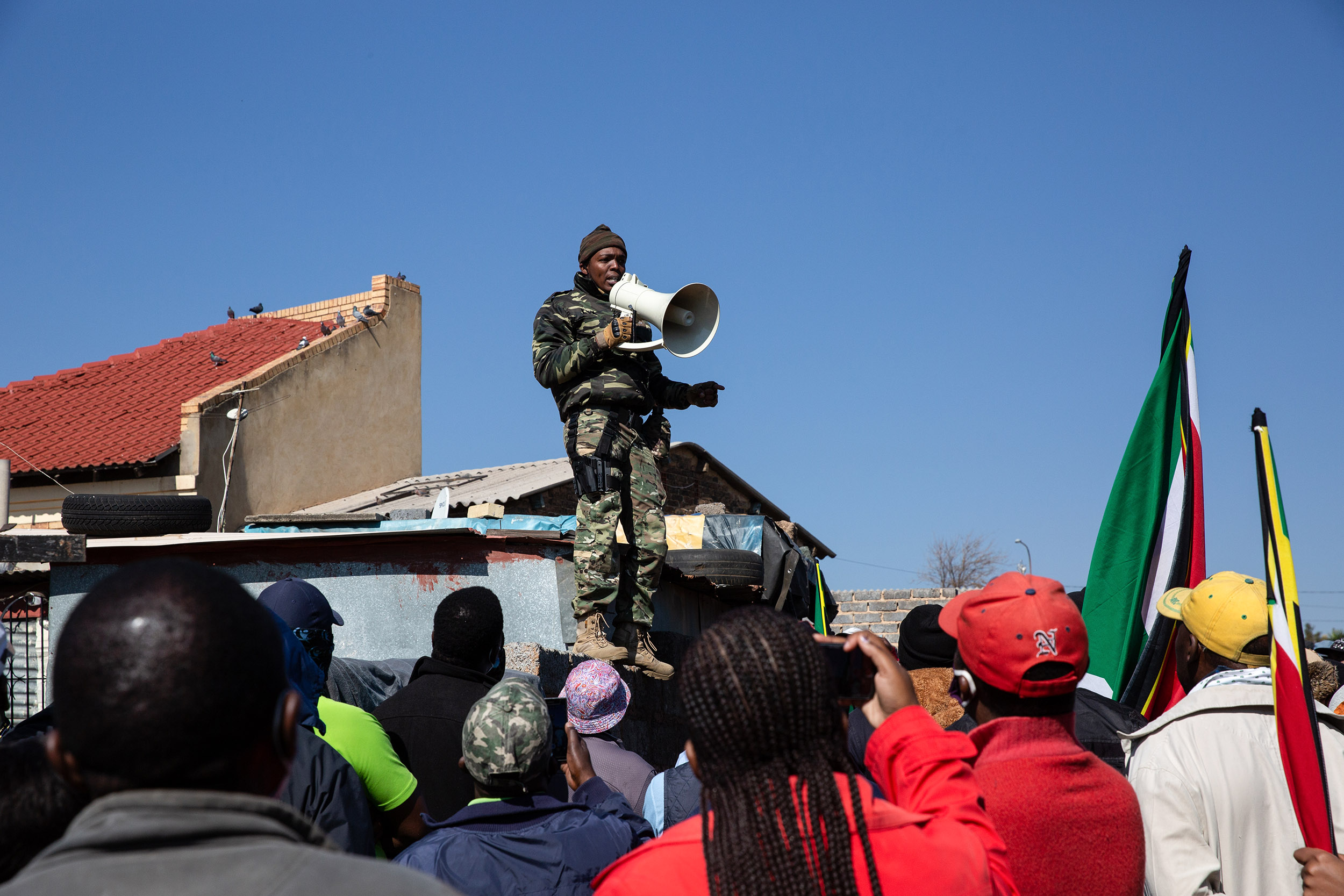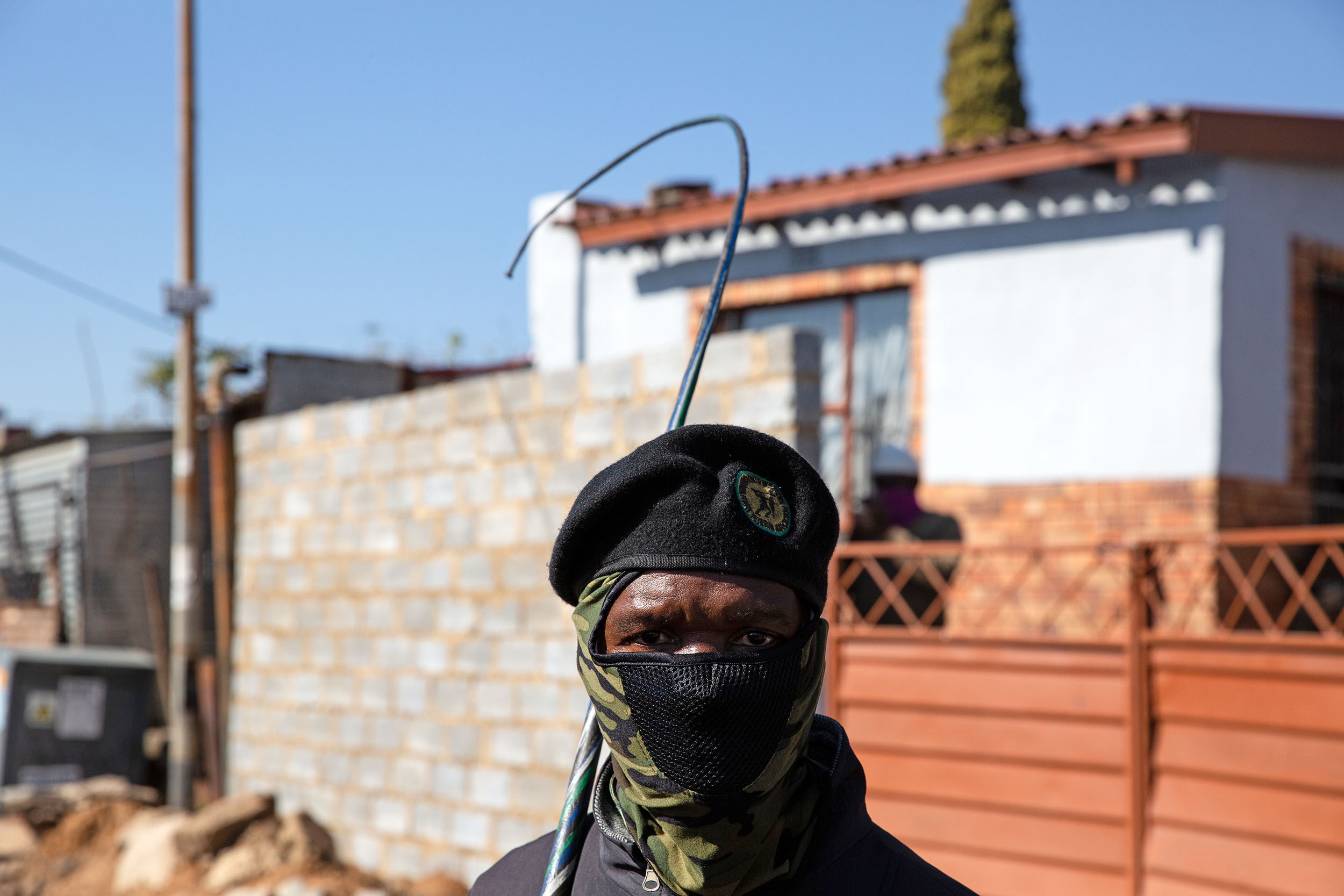Operation Dudula pushes ahead with hateful politics
A ‘clean-up’ march through Soweto led to sporadic lootings of migrant-owned shops and the eviction of some residents. A countermarch opposed the xenophobes and the rhetoric that fuels hatred.
Author:
24 June 2021

On the 45th anniversary of the June 16 uprising in Soweto, dozens of people armed with sjamboks and sticks met in Diepkloof, Soweto, under the banner of Operation Dudula. A poster about it had been circulating for weeks online, warning “We will be removing all illegal foreign nationals by force!!!” Similar posters doing the rounds contained even more inflammatory language and images.
Flyers had also been hand-delivered to migrant-owned shops in the weeks leading up to Youth Day, which commemorates those who died at the hands of the oppressive apartheid forces on 16 June 1976 while protesting against the use of Afrikaans as a medium of instruction in schools. “We demand that you vacate of our business in our township. A 7 day notice is given to you as of today (sic)…” It was signed “Military Veterans and Umphakathi (the community)”.
Despite the poster’s crude and alarming xenophobic statements as well as the messages accompanying it when it was shared online, the organisers of Operation Dudula, which means “to push”, claimed on the day they gathered at the Diepkloof Hall that the group was not xenophobic.


Peter Dimba, who identified himself as the chairperson of Operation Dudula, told the crowd: “We must be vigilant about people who are within ourselves [and] out here to create anarchy. They say we are here to loot. We never spoke about looting. We never spoke about xenophobia.”
Many of those carrying weapons had entirely different ideas about why they had come together. One man carrying a wooden pick handle said: “I don’t like foreigners. They must fuck off. They steal our jobs and they sell fake goods. I don’t like them.”
Asked about these comments, Dimba and other members of Operation Dudula said they were not specifically targeting migrants. Instead, their issue was with “everyone who doesn’t abide by our laws and by-laws”.
Fears of violence
The tone of the organisers seemed to have changed from the weeks before Operation Dudula to the actual day. There were concerns about the threat of widespread looting and violence after sporadic incidents of migrant-owned shops being looted earlier in the week. A 21-year-old man was shot during one of these events, on 15 June. Gauteng police spokesperson Captain Kay Makhubele said three migrant shopkeepers were arrested in connection with the shooting.
As fears around Operation Dudula increased, a broad coalition of organisations including grassroots groups, residents’ organisations, non-governmental organisations and the South African Federation of Trade Unions (Saftu) planned a countermarch condemning xenophobic violence. Ferron Pedro, the working-class campaigns coordinator for Saftu, said it was important to recognise international solidarity and ensure the safety of migrants, refugees and asylum seekers.
“We recognise that South Africa is an incredibly wealthy country but an incredibly unequal country. So with high rates of inequality, the working class in South Africa are quite desperate… There is incredible suffering, poverty and struggles that are being waged by the working class, by communities, by the poor and unemployed youth with staggering unemployment statistics,” Pedro said.
“As a result, often what we see is divisive, especially when it comes from political leadership or political elites, there can be divisions in the working class. We see it in hatred or attacks against women, we see it in attacks against LGBT communities, and of course we see it in attacks against migrant populations, asylum seekers and refugees. As Saftu we condemn those sentiments and we condemn those attacks.”


Pedro said it was important to build a mass working-class movement that would recognise these divisions in society and the working class. The broad coalition of organisations staged a picket near where Operation Dudula’s supporters were marching, and later moved to the Makause shack settlement in Germiston, east of Johannesburg.
“When we found out about Operation Dudula in Diepkloof, we were incredibly concerned because we think that this is a reactionary, right-wing phenomenon that comes out of the material conditions of the working class in that area and that sees an opportunity to not come together as a united working class, but to attack those who are probably some of the most vulnerable people in our society,” Pedro said.
“We condemn Operation Dudula unequivocally. We think that their idea of ‘cleaning up the streets’ is incredibly racist, prejudiced, it’s dangerous, and we don’t endorse it. We think we must do everything we can do [to] unite the working class.”
Blame laid at the wrong door
Mokesh Kantilal Morar, holding a cross with the words “Stop Xenophobia” on one side and “Stop Afrophobia” on the other, stood on the corner of a busy intersection near where Operation Dudula members were meeting.
“It is unfortunate that people would blame others for their suffering,” Morar said. “Instead, people should understand how we got here. The failures of our government led us here. It is not the fault of migrants. This is [an] unfortunate part of our situation as a country to see this. But as religious people we are not happy and we do not condone these kinds of actions.”
Migrant shopkeepers and migrant associations had been meeting with members of Operation Dudula and the Soweto Defence Force, which provides self-defence training to residents, since 14 June in an effort to prevent violence and looting.


Amir Sheikh, spokesperson for the Africa Diaspora Forum, which represents many of the migrant associations, was also part of these meetings. He said Sowetans raised concerns that there was an “influx of migrant businesses that are outcompeting the local community”.
Sheikh said as a compromise the migrant associations and shopkeepers recognised the need to have migrant-owned businesses audited. “There is also the need to hire locals, to at least show that we are not only employing amongst ourselves. The concern was that most of the shops employ [migrants] because they are cheap labour and that is why they don’t employ the local community.
“We agreed [on] the need to actually develop the relationship with ward councillors, ward committees, sector crime forums, the [community policing forum], station commanders and up to the district commissioner’s office, which was also lacking,” he said.
“We also talked of the need to come together and partner in the fields of job employment, skills development and issues of entrepreneurship training, especially for the youth… So it will be useful if we can do skills development training, especially to the most vulnerable youth, women and people with disabilities.”
Different page, same book
Nhlanhla Lux, a representative of the Soweto Defence Force as well as the Soweto Parliament, which describes itself as a non-political movement that aims to be the voice of ordinary Sowetans, was dressed in a camouflage outfit and tactical gloves and wore an empty gun holster. His Twitter feed has many pictures and videos of him in tactical gear, and a video titled “Making Soweto great again!” shows him shooting a firearm.
Contrary to what the flyer stated, Lux denied that Operation Dudula was xenophobic in nature. “What is important for our people to understand is this [looting and evictions] is an act of criminality. It is a criminal offence. The voice of the people – I know it is reflecting the view that foreign nationals must leave so that the township economy can go back into the hands of Sowetans. But there are ways of doing it.”
Lux said it was criminals who were committing these crimes and they had to be isolated from the rest of the community. He emphasised that Operation Dudula was not intended to be anti-migrant but rather to tackle a range of issues affecting the community.


Asked about those who were armed and made xenophobic statements, he said: “So the long and short of it is not everyone understands the operational plan. So it’s difficult to say that everyone is on the same page, but they can be in the same book. There is a page where the leadership is and then there is a page where the people are. We have different backgrounds.”
Lux insisted that the “leadership” were committed to law and order. “So we should make sure that the by-laws and the laws are respected so much that it is watertight, that it’s not easy for people to leave their countries.”
He added: “But even South Africans break these laws, so it is important to ensure these laws are watertight, that people don’t take advantage of the township economy and the township landscape in general.”
Dealing the cards
Despite Lux’s insistence that the group was not xenophobic, its supporters marched to an old post office where mostly migrant families were living. They gave them a warning to pack and leave within a certain timeframe.
Then, escorted by the police, they marched to another zone in Diepkloof and entered the homes of people they claimed were drug dealers, threatening them and telling them they were unwelcome. At the first house, instead of finding the “dealer”, the group and some of the police officers who followed them inside found a young woman and her confused uncle sitting in the kitchen.
The group proceeded to a few homes where people claimed to be drug dealers were living to warn them that they were not welcome in the neighbourhood any longer, all the while being escorted by the police. In none of the homes did they find any dealers or drugs. Makhubele failed to answer questions about this.
While the main group carried on through Diepkloof, a smaller group arrived at the post office and started evicting the people living there. Busisiwe Magwayi, 34, sat outside with her few belongings that had been removed by the group. She said she had been living in the post office for three years and had been paying rent.


“They came today and told us we must leave,” she said. “It is because we are living with foreigners, with people from Zimbabwe and Mozambique. I don’t know where to go. Where do I go now? Where do I sleep? They gave us no notice, they just came today and started taking out my things.”
Mike Moloi, who said he was a representative of the ANC-affiliated South African National Civic Organisation, disputed Magwayi’s version. He said the people living in the post office had been warned before that they should leave.
“They are foreigners. They are from Mozambique, Zimbabwe, Limpopo. See, this guy is from Limpopo,” Moloi said, pointing to one of the people who had been evicted.
“We’ve been talking and talking and now we are trying to help our government. Now, if government can’t come here, then who must do this then? We’ve got problems with electricity [in Soweto] but the people living here have electricity for mahhala (nothing). It doesn’t make sense,” he said.
